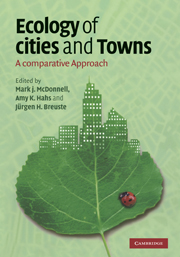Book contents
- Frontmatter
- Contents
- List of contributors
- Preface
- 1 Introduction: Scope of the book and need for developing a comparative approach to the ecological study of cities and towns
- Part I Opportunities and challenges of conducting comparative studies
- Part II Ecological studies of cities and towns
- Part III Integrating science with management and planning
- Part IV Comments and synthesis
- 30 What is the main object of urban ecology? Determining demarcation using the example of research into urban flora
- 31 How to conduct comparative urban ecological research
- 32 Ecological scientific knowledge in urban and land-use planning
- 33 Envisioning further steps in comparative urban ecology
- 34 Towards a comparative ecology of cities and towns
- 35 A comparative ecology of cities and towns: synthesis of opportunities and limitations
- References
- Index
- Plate section
32 - Ecological scientific knowledge in urban and land-use planning
Published online by Cambridge University Press: 04 March 2010
- Frontmatter
- Contents
- List of contributors
- Preface
- 1 Introduction: Scope of the book and need for developing a comparative approach to the ecological study of cities and towns
- Part I Opportunities and challenges of conducting comparative studies
- Part II Ecological studies of cities and towns
- Part III Integrating science with management and planning
- Part IV Comments and synthesis
- 30 What is the main object of urban ecology? Determining demarcation using the example of research into urban flora
- 31 How to conduct comparative urban ecological research
- 32 Ecological scientific knowledge in urban and land-use planning
- 33 Envisioning further steps in comparative urban ecology
- 34 Towards a comparative ecology of cities and towns
- 35 A comparative ecology of cities and towns: synthesis of opportunities and limitations
- References
- Index
- Plate section
Summary
Introduction
As has been argued by Grimm et al. (2000), the study of urban ecology can be divided into ecology in cities and ecology of cities. The former is studied by natural scientists and the latter by natural as well as social scientists. Many of the natural scientists have found that their scientific results and collected knowledge are only used to a small extent as underlying data in urban and land-use planning and design processes. The question is why?
For the integration of scientific results into the planning and design process, we have to know how those processes work. Over the past few centuries, planning processes have changed as society has developed. At the same time, the conceptualisation of planning processes has progressed. Here we are going to describe seven main modes of planning processes. The modes are: survey-analysis, rational, incrementalistic, mixed-scanning, stakeholder-driven, communicative, and strategic planning processes. On the one hand, we can see these different modes of planning as showing how planning has developed and changed over recent decades, and on the other hand, we can see the modes still working in parallel in different situations.
In what follows, partners involved in planning processes are separated into actors and stakeholders. By ‘stakeholders’ we mean those partners who have interests in the planning subject but are not necessarily as active in the process as the ‘actors’.
- Type
- Chapter
- Information
- Ecology of Cities and TownsA Comparative Approach, pp. 549 - 556Publisher: Cambridge University PressPrint publication year: 2009
- 4
- Cited by



